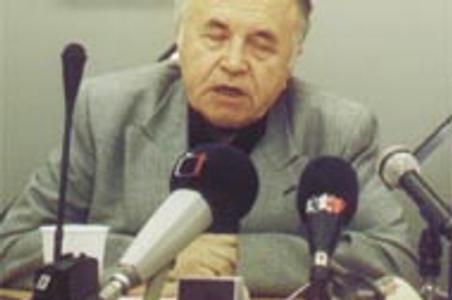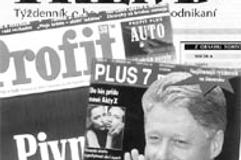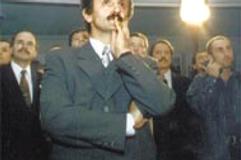Archive of articles - October 1998, page 7
If you desire to read an old article, use the search bar or select the publication date.
Halt demanded to privatisation
Fearing that the outgoing Mečiar government would use its last days in office to sell off valuable state properties, the newly elected parties of the former opposition have appealed for a moratorium on privatisation until a new government can be formed."We are appealing to the government, the [privatisation agency] National Property Fund [FNM] and all competent organisations not to privatise any company or institution," said Mikuláš Dzurinda, leader of the largest opposition party, the SDK, at a September 27 press conference.Dzurinda, who has been tapped as Slovakia's next Premier if the four former opposition parties can arrange a coalition, said he was most worried that important state-owned banks and other lucrative companies would be sold for a song by the outgoing government.
Two legs bad
Generations from now, Elections '98 may own a place in Slovak folklore as the moment when voters rescued the country from the hands of despots, thieves and zealots. For the moment, though, the nation seems to be taking Mečiar's defeat in stride, giving no hint that the crushing opposition victory was historically decisive.Part of this phlegmatism derives from the fact that Slovak politics is not a simple contest between brave white knights and dark scoundrels, despite all of the attempts of the opposition parties to present it as such. In casting their ballots for the opposition, electors actually chose the lesser of two evils.It may sound strange to call the former opposition, composed of four pro-western parties who talk like democrats, merely a 'lesser evil' than the autocratic government of Premier Vladimír Mečiar. But the recent behaviour of some opposition politicians suggests that the next government may not be as different from the last as people expect.
New TV station enters market
On September 8, the state Council for Radio and Television Broadcasting made significant changes to the licence of the Košice city television station, TV Naša. The TV station, which so far has broadcasted in the area of Košice, will now be able to broadcast nation-wide through satellite.According to the new licence conditions, TV Naša will be moving to digital, coded broadcasting, and the distributors of its programs will be the 12 cable television stations in Slovakia. These regional cable stations will at the same time be co-creators of TV Naša's programming. The new enterprise will bear the name TV Naša Global."We changed the licenses of all 12 companies that take part in the TV Naša project," said Jarmila Grujbárová, head of the council office.
Crown stable, rates sky-high
The Slovak crown continued to weaken against its mark-dollar basket over the week from September 23 to September 30. The crown has been under constant downward pressure from domestic corporate clients, and it hit an all time low level of minus -6.70% against the basket parity on September 25.The currency hovered between minus 6.20% and minus 6.70% through the week, but the central bank continued to support the crown by fixing it above market levels. The national bank kept its fixing unmoved at 5.95% below the basket midpoint. The market estimates that the central bank has so far used more than $500 million in the past three weeks to support the crown through fixings.
Slovak bourse falls below 100 points
The Bratislava Stock Exchange had another hard day on September 29 when the official SAX index, which measures the performance of the 16 most heavily capitalised issues on the bourse, plunged below 100 points for the first time ever during continuous trading.Although the index rebounded slightly before the end of trading and closed at 101.96 points, the latter is still the lowest level in its five year history. The SAX started its existence at 100 points at the beginning of 1993.The index touched 99.2 points in early activity on September 29, dragged down by the sale of 500 shares of the commercial bank VÚB. VÚB lost 30% of its value during the day's session on the main listed market, closing at 805 crowns per share.
Ad agencies, papers yearn for improved business climate
Slovakia's advertising and media market is slowly increasing in volume, but media experts warn that the figures are no reason for celebration. The volume of advertisements increased in first six months of 1998, they said, and should continue to drift slowly upwards. But the market still lags far behind that of the country's neighbours, and suffers from a poor political and economic climate."Some clients waited to invest in Slovakia because of the political climate and the market situation," said Peter Paška, commercial director at the Omnimedia ad agency. "Elections this year played a particular role in the volume of advertisements. But our client contacts did not have to be broken or decreased."
STV prepares for opposition "terror"
One day after the announcement of election results and the decision of opposition parties to form a coalition, Slovakia's state-owned STV channel suffered its first casualty. Hana Pravdová, STV news director, had a nervous breakdown and was rushed to hospital in Bratislava on September 28. The Slovak media said that Pravdová had been overwhelmed by infighting at STV over post-electoral changes at the station.STV, which was used by the government of Vladimír Mečiar as a propaganda tool over the past four years, will certainly undergo a personnel overhaul if the former opposition parties manage to form a government. But while politicians from these ascendant parties promise a just and orderly return to balanced programming, STV and its erstwhile masters in Mečiar's HZDS party are bracing for the worst.
IESC business volunteers leave Slovakia
The International Executive Service Corps, an American-based organization on retired business executives and other experts helping businesses around the world closed its office in Slovakia on September 30, "after seven years and more than 300 consulting missions in Slovakia," said Donald J. Shaughnessy, IECS's country director in Slovakia.But a Slovak organization will be created to take the place of IESC, with an experienced staff and initial American funding to provide busines and marketing services. The new group will also offer the same kind of consulting assistance IESC offered, drawing on the same pool of American volunteer experts to help Slovak companies find their way into the markets newly opened to them around the world.
Opposition wins 93 of 150 seats
National elections on September 25 and 26 gave a whopping 93 seats in Parliament to four opposition parties, spelling the virtual end for Premier Vladimír Mečiar's coalition government. Although Mečiar's HZDS party actually won the vote by a narrow margin with 27% support, opposition parties together captured over 58% of votes and vowed to form a coalition of their own to ensure Mečiar's defeat."These elections were a turning point in Slovakia's history," said Pavol Hamžík, vice-chairman of the opposition SOP party. "The opposition will have a constitutional majority [90 out of 150 seats in Parliament], enough to elect a President and make the constitutional changes needed to return this country to a normal life."
Old Parliament has 30 days
Although Slovakia's opposition parties are anxious to assume the reigns of power following their strong showing in national elections, the constitution gives Premier Vladimír Mečiar 30 days to call the first session of the newly elected parliament.Furthermore, the constitution does not specify who should be called on to form a new government - the party which scored the most votes in the election, or the party with the best chance of forming a coalition. The September 25-26 elections gave Mečiar's HZDS party a narrow victory with 27%, but handed more than 60% of seats in Parliament to a broad group of opposition parties which have promised to work together.
- Ambulance hit by Russian drone goes on display in centre of Bratislava
- Bratislava’s embassy-backed events you don’t want to miss
- Slovak Matters: A flirtatious Easter of water and whipping
- Slovakia mourns Pope Francis, a shepherd of hope and humility Photo
- Slovakia’s public finances remain in deep trouble
- What is Pope Francis’s message to the powerful?
- Danish shoemaker to shut Slovak factory, axing 650 jobs in fresh blow to struggling region
- News digest: Finns air unseen video of Fico shooting, PM’s bloody jacket driven away by minister
- Ambulance hit by Russian drone goes on display in centre of Bratislava
- Bratislava’s embassy-backed events you don’t want to miss
- “Return not,” the ocean cried. But I returned for her
- Slovakia mourns Pope Francis, a shepherd of hope and humility Photo
- Slovakia’s public finances remain in deep trouble
- Slovak Matters: A flirtatious Easter of water and whipping
- When to shop over Easter: Opening hours for supermarkets in Slovakia
- Danish shoemaker to shut Slovak factory, axing 650 jobs in fresh blow to struggling region
- Ambulance hit by Russian drone goes on display in centre of Bratislava
- “Return not,” the ocean cried. But I returned for her
- Bratislava’s embassy-backed events you don’t want to miss
- The British Film Institute shines a light on Slovak cinema’s boldest chapter Video
- 3 free things to do in Bratislava in the next seven days
- Slovakia's latest basketball star is destined for great things in the USA
- When to shop over Easter: Opening hours for supermarkets in Slovakia
- US giant pulls plug on Slovak factory, axing 137 jobs
- “Return not,” the ocean cried. But I returned for her
- Ambulance hit by Russian drone goes on display in centre of Bratislava
- German shoemaker Lowa joins wave of factory closures in Slovakia
- 3 free things to do in Bratislava in the next seven days
- US giant pulls plug on Slovak factory, axing 137 jobs
- When to shop over Easter: Opening hours for supermarkets in Slovakia
- Danish shoemaker to shut Slovak factory, axing 650 jobs in fresh blow to struggling region
- Hundreds of people ousted from Bratislava’s Volkswagen
- What is Pope Francis’s message to the powerful?
- Slovakia mourns Pope Francis, a shepherd of hope and humility Photo
- Confetti, chants and history: Hejková’s dream goodbye after nearly 40 years at the top
- Slovakia’s public finances remain in deep trouble
- Ambulance hit by Russian drone goes on display in centre of Bratislava
- Why this gorge deserves a spot on your bucket list Photo
- The British Film Institute shines a light on Slovak cinema’s boldest chapter Video
- Bratislava’s embassy-backed events you don’t want to miss More articles ›




